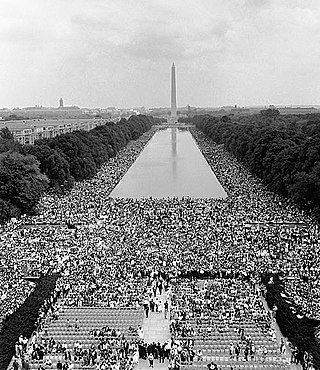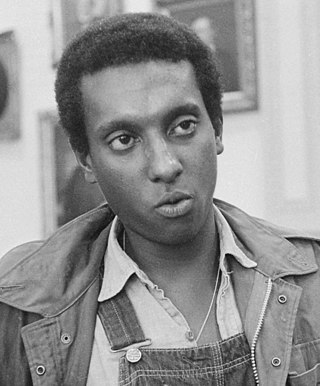Related Research Articles

Martin Luther King Jr. was an American Christian minister, activist, and political philosopher who was one of the most prominent leaders in the civil rights movement from 1955 until his assassination in 1968. A black church leader and a son of early civil rights activist and minister Martin Luther King Sr., King advanced civil rights for people of color in the United States through the use of nonviolent resistance and nonviolent civil disobedience against Jim Crow laws and other forms of legalized discrimination.

The civil rights movement was a social movement and campaign from 1954 to 1968 in the United States to abolish legalized racial segregation, discrimination, and disenfranchisement in the country. The movement had its origins in the Reconstruction era during the late 19th century and had its modern roots in the 1940s, although the movement made its largest legislative gains in the 1960s after years of direct actions and grassroots protests. The social movement's major nonviolent resistance and civil disobedience campaigns eventually secured new protections in federal law for the civil rights of all Americans.
Black supremacy or black supremacism is a racial supremacist belief which maintains that black people are inherently superior to people of other races.

The Montgomery bus boycott was a political and social protest campaign against the policy of racial segregation on the public transit system of Montgomery, Alabama. It was a foundational event in the civil rights movement in the United States. The campaign lasted from December 5, 1955—the Monday after Rosa Parks, an African-American woman, was arrested for her refusal to surrender her seat to a white person—to December 20, 1956, when the federal ruling Browder v. Gayle took effect, and led to a United States Supreme Court decision that declared the Alabama and Montgomery laws that segregated buses were unconstitutional.

Bayard Rustin was an American political activist, a prominent leader in social movements for civil rights, socialism, nonviolence, and gay rights. Rustin was the principal organizer of the March on Washington for Jobs and Freedom in 1963.

Ralph David Abernathy Sr. was an American civil rights activist and Baptist minister. He was ordained in the Baptist tradition in 1948. As a leader of the civil rights movement, he was a close friend and mentor of Martin Luther King Jr. He collaborated with King and E. D. Nixon to create the Montgomery Improvement Association, which led to the Montgomery bus boycott and co-created and was an executive board member of the Southern Christian Leadership Conference (SCLC). He became president of the SCLC following the assassination of King in 1968; he led the Poor People's Campaign in Washington, D.C., as well as other marches and demonstrations for disenfranchised Americans. He also served as an advisory committee member of the Congress on Racial Equality (CORE).

The Student Nonviolent Coordinating Committee was the principal channel of student commitment in the United States to the civil rights movement during the 1960s. Emerging in 1960 from the student-led sit-ins at segregated lunch counters in Greensboro, North Carolina, and Nashville, Tennessee, the Committee sought to coordinate and assist direct-action challenges to the civic segregation and political exclusion of African Americans. From 1962, with the support of the Voter Education Project, SNCC committed to the registration and mobilization of black voters in the Deep South. Affiliates such as the Mississippi Freedom Democratic Party and the Lowndes County Freedom Organization in Alabama also worked to increase the pressure on federal and state government to enforce constitutional protections.

The March on Washington for Jobs and Freedom, also known as simply the March on Washington or the Great March on Washington, was held in Washington, D.C., on August 28, 1963. The purpose of the march was to advocate for the civil and economic rights of African Americans. At the march, final speaker Dr. Martin Luther King Jr., standing in front of the Lincoln Memorial, delivered his historic "I Have a Dream" speech in which he called for an end to racism and racial segregation.

Kwame Ture was an American organizer in the civil rights movement in the United States and the global pan-African movement. Born in Trinidad in the Caribbean, he grew up in the United States from the age of 11 and became an activist while attending the Bronx High School of Science. He was a key leader in the development of the Black Power movement, first while leading the Student Nonviolent Coordinating Committee (SNCC), then as the "Honorary Prime Minister" of the Black Panther Party (BPP), and last as a leader of the All-African People's Revolutionary Party (A-APRP).

Civil rights movements are a worldwide series of political movements for equality before the law, that peaked in the 1960s. In many situations they have been characterized by nonviolent protests, or have taken the form of campaigns of civil resistance aimed at achieving change through nonviolent forms of resistance. In some situations, they have been accompanied, or followed, by civil unrest and armed rebellion. The process has been long and tenuous in many countries, and many of these movements did not, or have yet to, fully achieve their goals, although the efforts of these movements have led to improvements in the legal rights of some previously oppressed groups of people, in some places.

The Southern Christian Leadership Conference (SCLC) is an African-American civil rights organization based in Atlanta, Georgia. SCLC is closely associated with its first president, Martin Luther King Jr., who had a large role in the American civil rights movement.

The March Against Fear was a major 1966 demonstration in the Civil Rights Movement in the South. Activist James Meredith launched the event on June 5, 1966, intending to make a solitary walk from Memphis, Tennessee, to Jackson, Mississippi via the Mississippi Delta, starting at Memphis's Peabody Hotel and proceeding to the Mississippi state line, then continuing through, respectively, the Mississippi cities of Hernando, Grenada, Greenwood, Indianola, Belzoni, Yazoo City, and Canton before arriving at Jackson's City Hall. The total distance marched was approximately 270 miles over a period of 21 days. The goal was to counter the continuing racism in the Mississippi Delta after passage of federal civil rights legislation in the previous two years and to encourage African Americans in the state to register to vote. He invited only individual black men to join him and did not want it to be a large media event dominated by major civil rights organizations.
Wyatt Tee Walker was an African-American pastor, national civil rights leader, theologian, and cultural historian. He was a chief of staff for Martin Luther King Jr., and in 1958 became an early board member of the Southern Christian Leadership Conference (SCLC). He helped found a Congress for Racial Equality (CORE) chapter in 1958. As executive director of the SCLC from 1960 to 1964, Walker helped to bring the group to national prominence. Walker sat at the feet of his mentor, BG Crawley, who was a Baptist Minister in Brooklyn, NY and New York State Judge.

Cordy Tindell Vivian was an American minister, author, and close friend and lieutenant of Martin Luther King Jr. during the civil rights movement. Vivian resided in Atlanta, Georgia, and founded the C. T. Vivian Leadership Institute, Inc. He was a member of the Alpha Phi Alpha fraternity.
Joseph Harrison Jackson was an American pastor and the longest serving President of the National Baptist Convention, USA, Inc.

The Freedom Singers originated as a quartet formed in 1962 at Albany State College in Albany, Georgia. After folk singer Pete Seeger witnessed the power of their congregational-style of singing, which fused black Baptist a cappella church singing with popular music at the time, as well as protest songs and chants. Churches were considered to be safe spaces, acting as a shelter from the racism of the outside world. As a result, churches paved the way for the creation of the freedom song. After witnessing the influence of freedom songs, Seeger suggested The Freedom Singers as a touring group to the SNCC executive secretary James Forman as a way to fuel future campaigns. Intrinsically connected, their performances drew aid and support to the Student Nonviolent Coordinating Committee (SNCC) during the emerging civil rights movement. As a result, communal song became essential to empowering and educating audiences about civil rights issues and a powerful social weapon of influence in the fight against Jim Crow segregation. Rutha Mae Harris, a former freedom singer, speculated that without the music force of broad communal singing, the civil rights movement may not have resonated beyond of the struggles of the Jim Crow South. Their most notable song “We Shall Not Be Moved” translated from the original Freedom Singers to the second generation of Freedom Singers, and finally to the Freedom Voices, made up of field secretaries from SNCC. "We Shall Not Be Moved" is considered by many to be the "face" of the Civil Rights movement. Rutha Mae Harris, a former freedom singer, speculated that without the music force of broad communal singing, the civil rights movement may not have resonated beyond of the struggles of the Jim Crow South. Since the Freedom Singers were so successful, a second group was created called the Freedom Voices.
Black power is a political slogan and a name which is given to various associated ideologies which aim to achieve self-determination for black people. It is primarily, but not exclusively, used by black activists and other proponents of what the slogan entails in the United States. The black power movement was prominent in the late 1960s and early 1970s, emphasizing racial pride and the creation of black political and cultural institutions to nurture, promote and advance what was seen by proponents of the movement as being the collective interests and values of black Americans.
The Prayer Pilgrimage for Freedom, or Prayer Pilgrimage to Washington, was a 1957 demonstration in Washington, D.C., an early event in the Civil Rights Movement of the 1950s and 1960s. It was the occasion for Martin Luther King Jr.'s Give Us the Ballot speech.

The Nashville Student Movement was an organization that challenged racial segregation in Nashville, Tennessee, during the Civil Rights Movement. It was created during workshops in nonviolence taught by James Lawson. The students from this organization initiated the Nashville sit-ins in 1960. They were regarded as the most disciplined and effective of the student movement participants during 1960. The Nashville Student Movement was key in establishing leadership in the Freedom Riders.

And the Walls Came Tumbling Down is a 1989 autobiography written by civil rights leader Ralph Abernathy. The book charts his life and work with his best friend Dr. Martin Luther King Jr. in their leadership of the Civil Rights Movement to help African Americans obtain equal rights with white Americans. His book engendered much controversy due to Abernathy's allegations of King's infidelity the night before he was assassinated.
References
- ↑ Biography of C. T. Vivian Archived 2008-06-28 at the Wayback Machine , Providence Missionary Baptist Church.
- ↑ C. T. Vivian, Black Power and the American Myth (Philadelphia: Fortress Press, 1970), pp. 6-7.
- ↑ C. T. Vivian, Black Power and the American Myth (Philadelphia: Fortress Press, 1970).